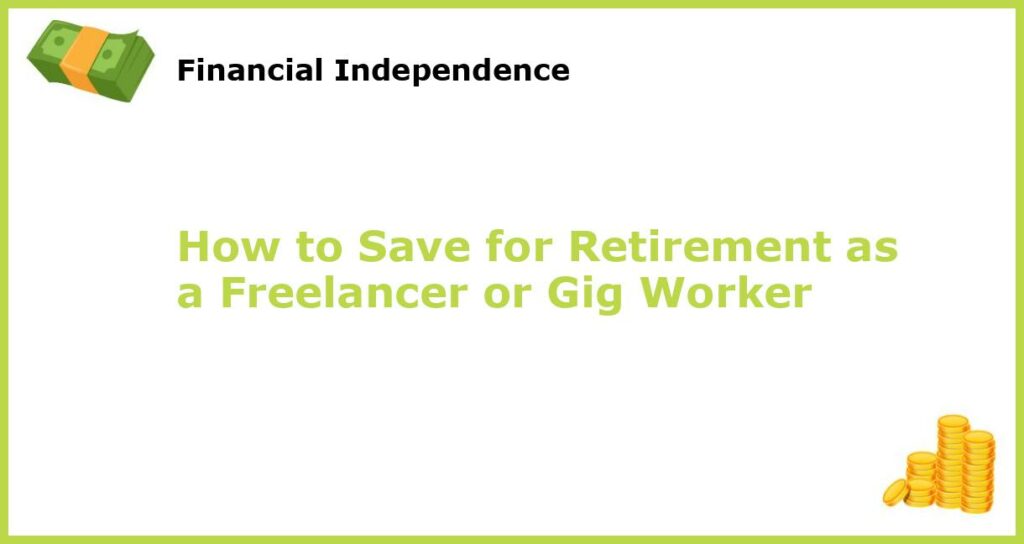As a freelancer or gig worker, saving for retirement can be a daunting task. Without a steady paycheck or employer-sponsored retirement plan, it’s up to you to save enough money to support yourself in retirement. However, there are several strategies you can use to build a retirement nest egg. In this article, we’ll discuss ten tips for saving for retirement as a freelancer or gig worker.
Create a Budget

The first step in saving for retirement as a freelancer or gig worker is to create a budget. This will help you determine how much money you have coming in and going out each month. When considering your budget, you should look for areas where you can cut back on expenses and increase savings. For example, you may be able to save money by cooking at home instead of eating out or reducing your entertainment budget. Additionally, you may want to prioritize debt repayment before focusing on retirement savings.
Set Retirement Goals

Setting retirement goals is an essential part of saving for retirement. Consider when you want to retire, how much income you’ll need in retirement, and how much you’ll need to save each month to achieve those goals. This information will serve as a roadmap for your retirement savings plan. Keep in mind that your retirement goals may change over time, and it’s vital to reevaluate them periodically. As you approach retirement, you may need to adjust your savings plan to ensure that you’re on track to meet your goals.
Invest in a Roth IRA

A Roth IRA is an excellent investment option for freelancers and gig workers. Unlike traditional IRAs, which are taxed when you withdraw money in retirement, Roth IRA contributions have already been taxed. Therefore, you can withdraw the money tax-free in retirement. Additionally, you can continue to contribute to a Roth IRA even if you have no earned income. This flexibility makes it an attractive option for those who may have fluctuating income levels.
Use a Self-Employed 401(k)

If you’re looking for a retirement plan that allows you to contribute more money each year than a traditional IRA, consider a self-employed 401(k). This retirement plan is designed specifically for self-employed individuals and allows you to contribute up to $56,000 in 2019. Unlike Roth IRAs, self-employed 401(k)s have tax advantages in the year you make the contribution. They offer a range of investment choices and are relatively easy to set up.
Save Automatically

Setting up automatic contributions to your retirement accounts is one of the easiest ways to save for retirement. This ensures that you’re saving a consistent amount each month without having to remember to make the contribution. Talk to your bank or financial institution about setting up automatic transfers from your checking account to your retirement accounts. You may also want to set up automatic contribution increases over time as your income increases to keep pace with your retirement savings goals.
Take Advantage of Tax Deductions
As a freelancer or gig worker, you may be eligible for tax deductions that can help you save for retirement. This includes deductions for contributions you make to a traditional IRA, a self-employed 401(k), or a Simplified Employee Pension (SEP) plan. Be sure to talk to a tax professional to determine which retirement plan may be the best fit for your financial situation.
Consider a SEP Plan
A Simplified Employee Pension (SEP) plan is another retirement plan option for self-employed individuals. This plan allows you to contribute up to 25% of your net earnings, up to a maximum of $56,000 in 2019. SEP plans are easy to set up and offer tax benefits that can help you save for retirement. However, keep in mind that you’ll need to make contributions for any eligible employees you have, so this may not be the best option if you have a large workforce.
Track Your Progress
Tracking your progress is an essential part of saving for retirement. It can help you identify areas where you need to increase your savings or make adjustments to your retirement goals. Use a retirement savings calculator to determine if you’re on track to meet your retirement goals. You may also want to review your plan periodically to ensure that it’s still meeting your needs.
Limit Your Debt
Debt can be one of the biggest obstacles to saving for retirement. As a freelancer or gig worker, it’s important to limit your debt as much as possible. This may mean taking on less work or finding ways to reduce your expenses. Start by paying off high-interest debt as soon as possible to free up more money for retirement savings. Consider consolidating debt to lower interest rates or refinancing debt where possible to ease the burden of payments.
Get Professional Advice
Finally, if you’re unsure about how to save for retirement as a freelancer or gig worker, consider talking to a financial professional. They can help you identify the best retirement savings plans for your needs and provide guidance as you work towards your retirement goals. A financial advisor can also help you navigate the complexities of tax laws and regulations to maximize your retirement savings.







